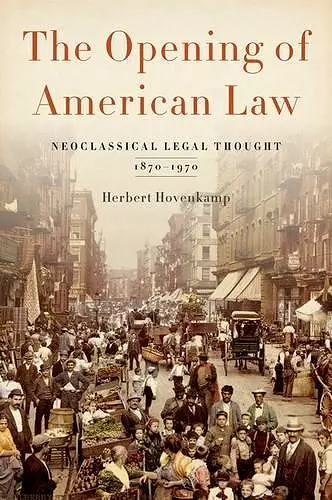The Opening of American Law
Neoclassical Legal Thought, 1870-1970
Format:Hardback
Publisher:Oxford University Press Inc
Published:13th Nov '14
Currently unavailable, and unfortunately no date known when it will be back

Two Victorian Era intellectual movements changed the course of American legal thought: Darwinian natural selection and marginalist economics. The two movements rested on fundamentally inconsistent premises. Darwinism emphasized instinct, random selection, and determinism. Marginalism emphasized rational choice. Legal theory managed to accommodate both, although to different degrees in different disciplines. The two movements also developed mutually exclusive scientific methodologies. Darwinism emphasizing external indicators of welfare such as productivity, education or health, while marginalists emphasized market choice. Historians have generally exaggerated the role of Darwinism in American legal thought, while understating the role of marginalist economics. This book explores these issues in several legal disciplines. One is Progressive Era movements for redistributive policies about taxation and public goods. Darwinian science also dominated the law of race relations, while criminal law reflected an inconsistent mixture of Darwinian and marginalist incentive-based theories. The common law, including family law, contract, property, and tort, moved from emphasis on correction of past harms to management of ongoing risk and relationship. A chapter on Legal Realism emphasizes the Realists' indebtedness to institutional economics, a movement that powerfully influenced American legal theory long after it fell out of favor with economists. Five chapters on the corporation, innovation and competition policy show how marginalist economics transformed business policy. The ironic exception was patent law, which developed in relative insulation from economic concerns about innovation policy. The book concludes with three chapters on public law, emphasizing the role of institutionalist economics in policy making during and after the New Deal. A lengthy epilogue then explores the variety of postwar attempts to reconstruct a defensible and more market-oriented rule of law after the decline of Legal Realism and the New Deal.
The main reason why I found The Opening of American Law fascinating and worth reading is that it clearly demonstrates the strength and resilience of classical political economy in affecting American law, even long after the approach had been challenged, and eventually displaced, by alternative theoretical paradigms. * Nicola Giocoli (University of Pisa), Journal of the History of Economic *
It is not often that a book offers a broad intellectual history of how the social sciences influence the development of law and legal thought. However, this is exactly what Professor Hovenkamp does in his latest book about the intellectual history of American law. Overall, this book would be a very useful complement to courses on comparative law, antitrust, and law and economics courses. * Andrés Palacios Lleras, World Competition Law and Economics Review *
ISBN: 9780199331307
Dimensions: 240mm x 165mm x 36mm
Weight: 762g
472 pages